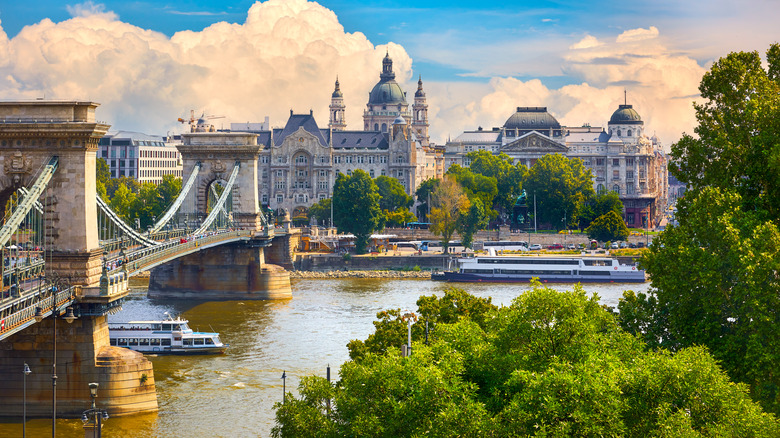Rick Steves' Protege Shares His Thoughts On Visiting This Central European Country During Political Turmoil
Travel is all about new experiences and delving into new cultures, but what happens when political turmoil takes hold in the place you want to visit? Is it still safe — and still ethical — to go in the midst of these issues? This is a struggle that Cameron Hewitt faced when he spent a week in Budapest updating Rick Steves' guidebook to Hungary's capital. As Steves' protege encountered new monuments installed by the right-wing Viktor Orbán government mixed in with classics like Budapest's famous thermal baths, he grappled with how to experience the changing dynamics of the city.
In a lengthy Facebook post, Hewitt discussed his ethical dilemma in depth. Calling Prime Minister Viktor Orbán's government "a template for the far-right, nativist, 'soft authoritarian' movement that has been sweeping the globe," he wondered if it was the right thing to do to put his money into an economy that is dismantling the freedom of the very people who live there. Orbán, who has been in office since 2010 and served the same position from 1998 to 2002, has not only taken control of state media but also changed the constitution to favor his own re-election in a move that the European Union said violated the rules it sets for its members.
Hewitt said he has a deep affection for the city, which he's visited many times. But he also acknowledged that some of the joy of experiencing the city as a tourist has worn off due to his knowledge of what's happening politically, just as many Canadians are deciding not to vacation in America as a show of their displeasure with President Donald Trump. But there are a few compelling reasons why he feels that, ultimately, it's the right decision to keep visiting politically challenging places.
Why Cameron Hewitt thinks it's okay to visit to continue visiting Budapest
In reminding us that the purpose of travel is to both have fun and learn, Cameron Hewitt acknowledged that casual fun can take a back seat in places like Budapest, where the government is reshaping the national narrative. "If the politics pivot toward the more alarming end of the spectrum, I may (quite selfishly) find it less purely 'enjoyable' to spend time there — but my travels become more poignant and impactful, and the lessons I bring home are more important than ever," he wrote on Facebook.
At the same time, he was also careful to remember that a country's elected officials do not necessarily reflect the will of all its citizens. Just as many in the United States did not vote for Donald Trump, so too did many Hungarians not vote for Viktor Orbán and his Fidesz party. Hewitt reminds us that practicing simple respect for the individual, without generalization or judgment, opens you up to learning more and seeing how what's happening elsewhere might also reflect what's happening at home.
More than ever, he said, we need to stay on the move, pushing ourselves to travel more in uncertain times. "If one goal of the Orbán/Trump movement is isolationism, then by staying home, we're giving in," he wrote. April 2026 will be an important time for Hungary, with general elections taking place and a political challenger to Orbán rising in popularity. By visiting Budapest, Hewitt said, he was able to gain a local perspective on the upcoming elections, something he would never have gotten sitting at home. "I will keep going back to Hungary, and to other places facing political instability, to cultivate a more sophisticated understanding for how other people see the world from outside my own borders," he wrote. "After all... isn't that why we travel?"

